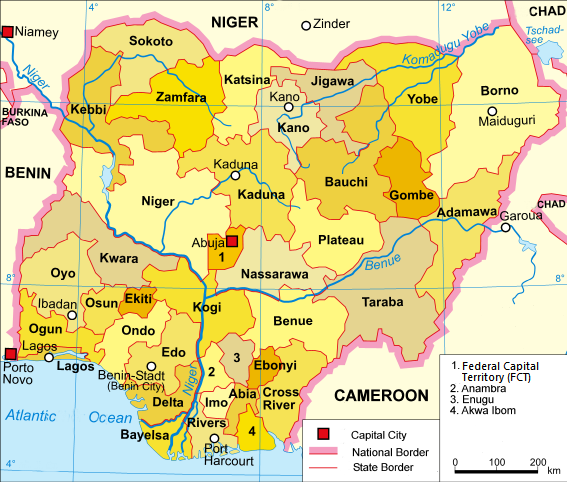The Federal Republic of Nigeria, commonly referred to as Nigeria, is a federal republic in West Africa, bordering Niger in the north, Chad in the northeast, Cameroon in the southeast, and Benin in the west. Its coast in the south is located on the Gulf of Guinea in the Atlantic Ocean. The federation comprises 36 states and 1 Federal Capital Territory, where the capital, Abuja is located. Nigeria is officially a democratic secular country.
Nigeria has been home to a number of ancient and indigenous kingdoms and states over the millennia. The modern state originated from British colonial rule beginning in the 19th century, and took its present territorial shape with the merging of the Southern Nigeria Protectorate and Northern Nigeria Protectorate in 1914. The British set up administrative and legal structures while practising indirect rule through traditional chiefdoms. Nigeria became a formally independent federation in 1960. It experienced a civil war from 1967 to 1970. It thereafter alternated between democratically elected civilian governments and military dictatorships until it achieved a stable democracy in 1999, with the 2011 presidential election considered the first to be reasonably free and fair.
Nigeria is often referred to as the "Giant of Africa", owing to its large population and economy. With 186 million inhabitants, Nigeria is the most populous country in Africa and the seventh most populous country in the world. Nigeria has the third-largest youth population in the world, after India and China, with more than 90 million of its population under age 18. The country is viewed as a multinational state as it is inhabited by 250 ethnic groups, of which the three largest are the Hausa, Igbo and Yoruba; these ethnic groups speak over 250 different languages and are identified with a wide variety of cultures. The official language is English. Nigeria is divided roughly in half between Christians, who live mostly in the southern part of the country, and Muslims, who live mostly in the north. A minority of the population practice religions indigenous to Nigeria, such as those native to the Igbo and Yoruba ethnicity.
As of 2015, Nigeria is the world's 20th largest economy, worth more than $500 billion and $1 trillion in terms of nominal GDP and purchasing power parity respectively. It overtook South Africa to become Africa's largest economy in 2014. The 2013 debt-to-GDP ratio was 11 percent. Nigeria is considered to be an emerging market by the World Bank; it has been identified as a regional power on the African continent, a middle power in international affairs, and has also been identified as an emerging global power. However, it currently has a "low" Human Development Index, ranking 152nd in the world. Nigeria is a member of the MINT group of countries, which are widely seen as the globe's next "BRIC-like" economies. It is also listed among the "Next Eleven" economies set to become among the biggest in the world. Nigeria is a founding member of the African Union and a member of many other international organizations, including the United Nations, the Commonwealth of Nations and OPEC.
The name Nigeria was taken from the Niger River running through the country. This name was coined in the late 19th century by British journalist Flora Shaw, who later married Lord Lugard, a British colonial administrator. The origin of the name Niger, which originally applied only to the middle reaches of the Niger River, is uncertain. The word is likely an alteration of the Tuareg name egerew n-igerewen used by inhabitants along the middle reaches of the river around Timbuktu prior to 19th-century European colonialism.
READ ALSO IGBO CULTURAL HERITRAGE
History
 |
| Ceremonial Igbo pot from 9th-century |
Early (500 BC – 1500)
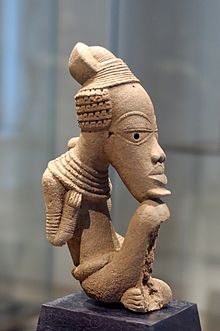 |
| Nok sculpture, terracotta |
The Kingdom of Nri of the Igbo people consolidated in the 10th century and continued until it lost its sovereignty to the British in 1911. Nri was ruled by the Eze Nri, and the city of Nri is considered to be the foundation of Igbo culture. Nri and Aguleri, where the Igbo creation myth originates, are in the territory of the Umeuri clan. Members of the clan trace their lineages back to the patriarchal king-figure Eri. In West Africa, the oldest bronzes made using the lost-wax process were from Igbo-Ukwu, a city under Nri influence.
READ ALSO YORUBA HISTORY,PEOPLE AND CULTURE
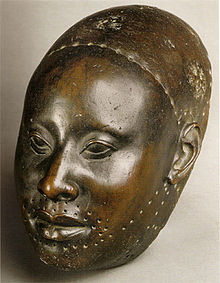 | ||
| Yoruba copper mask of Obalufon from the city of Ife, |
The Yoruba kingdoms of Ife and Oyo in southwestern Nigeria became prominent in the 12th and 14th centuries, respectively. The oldest signs of human settlement at Ife's current site date back to the 9th century, and its material culture includes terracotta and bronze figures.
Middle Ages (1500–1800)
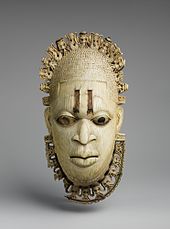 |
| Royal Benin ivory mask, one of Nigeria's most recognised artefacts. Benin Empire, 16th century. |
Oyo, at its territorial zenith in the late 17th to early 18th centuries, extended its influence from western Nigeria to modern-day Togo. The Edo's Benin Empire is located in southwestern Nigeria. Benin's power lasted between the 15th and 19th centuries. Their dominance reached as far as the city of Eko (an Edo name later changed to Lagos by the Portuguese) and further.
At the beginning of the 19th century, Usman dan Fodio directed a successful jihad and created and led the centralised Fulani Empire (also known as the Sokoto Caliphate). The territory controlled by the resultant state included much of modern-day northern and central Nigeria; it lasted until the 1903 break-up of the Empire into various European colonies.
 |
| Benin City in the 17th century with the Oba of Benin in procession. |
Slavery also existed in the territories comprising modern-day Nigeria; its scope was broadest towards the end of the 19th century. According to the Encyclopedia of African History, "It is estimated that by the 1890s the largest slave population of the world, about 2 million people, was concentrated in the territories of the Sokoto Caliphate. The use of slave labor was extensive, especially in agriculture."
A changing legal imperative (transatlantic slave trade outlawed by Britain in 1807) and economic imperative (a desire for political and social stability) led most European powers to support widespread cultivation of agricultural products, such as the palm, for use in European industry.
READ ALSO UNIQUE HISTORY OF THE BINI KINGDOM
British Nigeria (1800–1960)
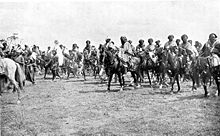 |
| Emir of Kano, with cavalry, photographed in 1911 |
 |
| King Duke of Calabar in full dress |
In 1885, British claims to a West African sphere of influence received recognition from other European nations at the Berlin Conference. The following year, it chartered the Royal Niger Company under the leadership of Sir George Taubman Goldie. In 1900 the company's territory came under the control of the British government, which moved to consolidate its hold over the area of modern Nigeria. On 1 January 1901, Nigeria became a British protectorate, and part of the British Empire, the foremost world power at the time. In the late 19th and early 20th centuries the independent kingdoms of what would become Nigeria fought a number of conflicts against the British Empire's efforts to expand its territory. By war, the British conquered Benin in 1897, and, in the Anglo-Aro War (1901–1902), defeated other opponents. The restraint or conquest of these states opened up the Niger area to British rule.
 |
| Postage stamp with portrait of Queen Elizabeth II |
Christian missions established Western educational institutions in the Protectorates. Under Britain's policy of indirect rule and validation of Islamic tradition, the Crown did not encourage the operation of Christian missions in the northern, Islamic part of the country. Some children of the southern elite went to Great Britain to pursue higher education. By independence in 1960, regional differences in modern educational access were marked. The legacy, though less pronounced, continues to the present day. Imbalances between North and South were expressed in Nigeria's political life as well. For instance, northern Nigeria did not outlaw slavery until 1936 whilst in other parts of Nigeria slavery was abolished soon after colonialism.
Following World War II, in response to the growth of Nigerian nationalism and demands for independence, successive constitutions legislated by the British government moved Nigeria toward self-government on a representative and increasingly federal basis. By the middle of the 20th century, a great wave for independence was sweeping across Africa. Nigeria achieved independence in 1960.
Independent Federation and First Republic (1960–1966)
The Federation of Nigeria gained independence from the United Kingdom on 1 October 1960, while retaining the British monarch, Elizabeth II, as nominal head of state and Queen of Nigeria. Nigeria's government was a coalition of conservative parties: the Nigerian People's Congress (NPC), a party dominated by Northerners and those of the Islamic faith, and the Igbo and Christian-dominated National Council of Nigeria and the Cameroons (NCNC) led by Nnamdi Azikiwe. Azikiwe replaced the colonial governor-general in November 1960. The opposition comprised the comparatively liberal Action Group (AG), which was largely dominated by the Yoruba and led by Obafemi Awolowo. The cultural and political differences between Nigeria's dominant ethnic groups – the Hausa ('Northerners'), Igbo ('Easterners') and Yoruba ('Westerners') – were sharp.An imbalance was created in the polity by the result of the 1961 plebiscite. Southern Cameroons opted to join the Republic of Cameroon while Northern Cameroons chose to remain in Nigeria. The northern part of the country was now far larger than the southern part. In 1963, the nation established a Federal Republic, with Azikiwe as its first president. When elections were held in 1965, the Nigerian National Democratic Party came to power in Nigeria's Western Region
READ ALSO FULANI TRIBE AND HISTORY
Civil war (1967–1970)
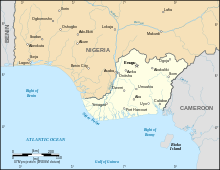 |
| The Republic of Biafra in June 1967, when it declared its independence from the rest of Nigeria |
Later, the counter-coup of 1966, supported primarily by Northern military officers, facilitated the rise of Lt. Colonel Yakubu Gowon to head of state. Tension rose between North and South; Igbos in Northern cities suffered persecution and many fled to the Eastern Region.
In May 1967, the Eastern Region declared independence as a state called the Republic of Biafra, under the leadership of Lt. Colonel Emeka Ojukwu. The Nigerian Civil War began as the official Nigerian government side attacked Biafra on 6 July 1967 at Garkem. The 30-month war, with a long siege of Biafra and its isolation from trade and supplies, ended in January 1970. Estimates of the number of dead in the former Eastern Region are between 1 and 3 million people, from warfare, disease, and starvation, during the 30-month civil war.
France, Egypt, the Soviet Union, Britain, Israel, and others were deeply involved in the civil war behind the scenes. Britain and the Soviet Union were the main military backers of the Nigerian government while France and others aided the Biafrans. Nigeria used Egyptian pilots for their air force.
Military juntas (1970–1999)
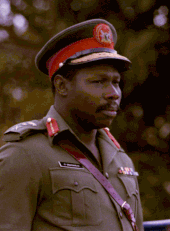 |
| Olusegun Obasanjo was a military president who ruled the country from 1976 to 1979. |
During the oil boom of the 1970s, Nigeria joined OPEC and the huge oil revenues it was generating enriched the economy. Despite these revenues, the military government did little to improve the standard of living of the population, help small and medium businesses, or invest in infrastructure. As oil revenues fueled the rise of federal subsidies to states, the federal government became the centre of political struggle and the threshold of power in the country. As oil production and revenue rose, the Nigerian government became increasingly dependent on oil revenues and on international commodity markets for budgetary and economic concerns. It did not develop alternate revenue sources in the economy for economic stability. That spelled doom to federalism in Nigeria.
Beginning in 1979, Nigerians participated in a return to democracy when Olusegun Obasanjo transferred power to the civilian regime of Shehu Shagari. The Shagari government became viewed as corrupt by virtually all sectors of Nigerian society. In 1983 the inspectors of the state-owned Nigerian National Petroleum Corporation (NNPC) began to notice "the slow poisoning of the waters of this country".The military coup of Muhammadu Buhari shortly after the regime's re-election in 1984 was generally viewed as a positive development. Buhari promised major reforms, but his government fared little better than its predecessor. His regime was overthrown by another military coup in 1985.
The new head of state, Ibrahim Babangida, declared himself president and commander in chief of the armed forces and of the ruling Supreme Military Council. He set 1990 as the official deadline for a return to democratic governance. Babangida's tenure was marked by a flurry of political activity: he instituted the International Monetary Fund's Structural Adjustment Program (SAP) to aid in the repayment of the country's crushing international debt. At the time most federal revenue was dedicated to servicing that debt. He enrolled Nigeria in the Organization of the Islamic Conference, which aggravated religious tensions in the country.
Babangida survived an abortive coup, then postponed a promised return to democracy to 1992. Free and fair elections were finally held on 12 June 1993, the first since the military coup of 1983, with a presidential victory for Moshood Kashimawo Olawale Abiola of the Social Democratic Party, who gained some 58% of the votes, defeating Bashir Tofa of the National Republican Convention. However, Babangida annulled the elections, leading to massive civilian protests that effectively shut down the country for weeks. Babangida finally kept his promise to relinquish office to a civilian government, but not before appointing Ernest Shonekan head of an interim government. Babangida's regime has been considered the most corrupt, and responsible for creating a culture of corruption in Nigeria.
In late 1993 Shonekan's caretaker regime was overwhelmed by the military coup of General Sani Abacha, who used military force on a wide scale to suppress the continuing civilian unrest. He shifted money to offshore accounts in western European banks and defeated coup plots by bribing army generals. In 1995 the government hanged environmentalist Ken Saro-Wiwa on trumped-up charges in the deaths of four Ogoni elders. Lawsuits under the American Alien Tort Statute against Royal Dutch Shell and Brian Anderson, the head of Shell's Nigerian operation, settled out of court with Shell continuing to deny liability.
Several hundred million dollars in accounts traced to Abacha were discovered in 1999.The regime came to an end in 1998, when the dictator died in the villa. His successor, General Abdulsalami Abubakar, adopted a new constitution on 5 May 1999, which provided for multiparty elections. On 29 May 1999 Abubakar transferred power to the winner of the elections, Obasanjo, who had since retired from the military.Ethnic violence for control over the oil-producing Niger Delta region and inadequate infrastructures are some of the issues in the country. Umaru Yar'Adua of the People's Democratic Party (PDP) came into power in the general election of 2007. The international community has been observing Nigerian elections to encourage a free and fair process, and condemned this one as being severely flawed.
Yar'Adua died on 5 May 2010. Dr. Goodluck Jonathan was sworn in as Yar'Adua's replacement on 6 May 2010, becoming Nigeria's 14th Head of State, while his vice-president, Namadi Sambo, an architect and former Kaduna State governor, was chosen on 18 May 2010, by the National Assembly. His confirmation followed President Jonathan's nomination of Sambo to that position.
Goodluck Jonathan served as Nigeria's president until 16 April 2011, when a new presidential election in Nigeria was conducted. Jonathan of the PDP was declared the winner on 19 April 2011, having won the election with a total of 22,495,187 of the 39,469,484 votes cast, to stand ahead of Muhammadu Buhari from the main opposition party, the Congress for Progressive Change (CPC), which won 12,214,853 of the total votes cast. The international media reported the elections as having run smoothly with relatively little violence or voter fraud, in contrast to previous elections.
In the March 2015 election, Muhammadu Buhari defeated Goodluck Jonathan by roughly 2 million votes. Observers generally praised the election as being fair. Jonathan was generally praised for conceding defeat and limiting the risk of unrest.
Government and politics
 | |||
| Nigerian National Assembly, Abuja |
 |
| Muhammadu Buhari, President, 29 May 2015–current |
The president's power is checked by a Senate and a House of Representatives, which are combined in a bicameral body called the National Assembly. The Senate is a 109-seat body with three members from each state and one from the capital region of Abuja; members are elected by popular vote to four-year terms. The House contains 360 seats, with the number of seats per state is determined by population.
Ethnocentrism, tribalism, religious persecution, and prebendalism have affected Nigerian politics both prior and subsequent to independence in 1960. Kin-selective altruism has made its way into Nigerian politics, resulting in tribalist efforts to concentrate Federal power to a particular region of their interests. Nationalism has also led to active secessionist movements such as MASSOB, Nationalist movements such as Oodua Peoples Congress, Movement for the Emancipation of the Niger Delta and a civil war. Nigeria's three largest ethnic groups (Hausa, Igbo and Yoruba) have maintained historical preeminence in Nigerian politics; competition amongst these three groups has fuelled corruption and graft.
Because of the above issues, Nigeria's political parties are pan-national and secular in character (though this does not preclude the continuing preeminence of the dominant ethnicities).The two major political parties are the People's Democratic Party of Nigeria and the All Progressives Congress. About twenty minor opposition parties are registered.
The then-president, Olusegun Obasanjo, acknowledged fraud and other electoral "lapses" but said the result reflected opinion polls. In a national television address in 2007, he added that if Nigerians did not like the victory of his handpicked successor, they would have an opportunity to vote again in four years.
In the Nigerian general election, 2015, the victorious All Progressives Congress has 225 House seats and 60 in the Senate while the defeated People's Democratic Party of Nigeria became the opposition with 125 seats in the House and 49 in the Senate.
Law
There are three distinct systems of law in Nigeria:- Common law, derived from its British colonial past, and a development of its own after independence;
- Customary law, derived from indigenous traditional norms and practice, including the dispute resolution meetings of pre-colonial Yorubaland secret societies and the Ẹ̀kpẹ̀ and Ọ̀kọ́ńkọ̀ of Igboland and Ibibioland;
- Sharia law, used only in the predominantly Muslim northern states of the country. It is an Islamic legal system that had been used long before the colonial administration. In late 1999, Zamfara emphasised its use, with eleven other northern states following suit. These states are Kano, Katsina, Niger, Bauchi, Borno, Kaduna, Gombe, Sokoto, Jigawa, Yobe, and Kebbi.
Foreign relations
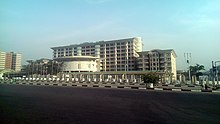 |
| The Ministry of Foreign Affairs, Abuja |
Nigeria's foreign policy was tested in the 1970s after the country emerged united from its own civil war. It supported movements against white minority governments in the Southern Africa sub-region. Nigeria backed the African National Congress (ANC) by taking a committed tough line with regard to the South African government and their military actions in southern Africa. Nigeria was also a founding member of the Organisation for African Unity (now the African Union), and has tremendous influence in West Africa and Africa on the whole. Nigeria has additionally founded regional cooperative efforts in West Africa, functioning as standard-bearer for the Economic Community of West African States (ECOWAS) and ECOMOG, economic and military organizations, respectively.
With this Africa-centred stance, Nigeria readily sent troops to the Congo at the behest of the United Nations shortly after independence (and has maintained membership since that time). Nigeria also supported several Pan-African and pro-self government causes in the 1970s, including garnering support for Angola's MPLA, SWAPO in Namibia, and aiding opposition to the minority governments of Portuguese Mozambique, and Rhodesia.
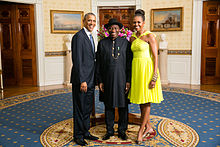 |
| Former Nigerian President Goodluck Jonathan (center) poses with United States President Barack Obama and First Lady Michelle Obama in August 2014 |
Nigeria has remained a key player in the international oil industry since the 1970s, and maintains membership in Organization of the Petroleum Exporting Countries (OPEC), which it joined in July 1971. Its status as a major petroleum producer figures prominently in its sometimes volatile international relations with both developed countries, notably the United States, and the developing countries of China, Jamaica, and Ghana and Kenya in Africa.
Millions of Nigerians have emigrated during times of economic hardship, primarily to Europe, North America and Australia. It is estimated that over a million Nigerians have emigrated to the United States and constitute the Nigerian American populace. Individuals in many such Diasporic communities have joined the "Egbe Omo Yoruba" society, a national association of Yoruba descendants in North America.
Military
 |
Nigerian Air Force Alenia G-222
|
 |
Nigerian Air Force Mil Mi-35P
|
 |
Nigerian Navy (NNS) Thunder ship
|
The Nigerian Military consist of an army, a navy, and an air force. The military in Nigeria have played a major role in the country's history since independence. Various juntas have seized control of the country and ruled it through most of its history. Its last period of military rule ended in 1999 following the sudden death of former dictator Sani Abacha in 1998. His successor, Abdulsalam Abubakar, handed over power to the democratically-elected government of Olusegun Obasanjo the next year.
As Africa's most populated country, Nigeria has repositioned its military as a peacekeeping force on the continent. Since 1995, the Nigerian military, through ECOMOG mandates, have been deployed as peacekeepers in Liberia (1997), Ivory Coast (1997–1999), and Sierra Leone (1997–1999). Under an African Union mandate, it has stationed forces in Sudan's Darfur region to try to establish peace.
Geography
Map of Nigeria, showing state boundaries, cities, and waterways.
 |
| Nigeria map of Köppen climate |
 |
| The Zuma Rock near Suleja |
Nigeria has a varied landscape. The far south is defined by its tropical rainforest climate, where annual rainfall is 60 to 80 inches (1,500 to 2,000 mm) a year. In the southeast stands the Obudu Plateau. Coastal plains are found in both the southwest and the southeast. This forest zone's most southerly portion is defined as "salt water swamp", also known as a mangrove swamp because of the large amount of mangroves in the area. North of this is fresh water swamp, containing different vegetation from the salt water swamp, and north of that is rainforest.
Nigeria's most expansive topographical region is that of the valleys of the Niger and Benue river valleys (which merge into each other and form a "y" shape). To the southwest of the Niger is "rugged" highland. To the southeast of the Benue are hills and mountains, which form the Mambilla Plateau, the highest plateau in Nigeria. This plateau extends through the border with Cameroon, where the montane land is part of the Bamenda Highlands of Cameroon.
The area near the border with Cameroon close to the coast is rich rainforest and part of the Cross-Sanaga-Bioko coastal forests ecoregion, an important centre for biodiversity. It is habitat for the drill monkey, which is found in the wild only in this area and across the border in Cameroon. The areas surrounding Calabar, Cross River State, also in this forest, are believed to contain the world's largest diversity of butterflies. The area of southern Nigeria between the Niger and the Cross Rivers has lost most of its forest because of development and harvesting by increased population, with it being replaced by grassland
Everything in between the far south and the far north is savannah (insignificant tree cover, with grasses and flowers located between trees). Rainfall is more limited, to between 500 and 1,500 millimetres (20 and 60 in) per year. The savannah zone's three categories are Guinean forest-savanna mosaic, Sudan savannah, and Sahel savannah. Guinean forest-savanna mosaic is plains of tall grass interrupted by trees. Sudan savannah is similar but with shorter grasses and shorter trees. Sahel savannah consists of patches of grass and sand, found in the northeast. In the Sahel region, rain is less than 500 millimetres (20 in) per year and the Sahara Desert is encroaching. In the dry northeast corner of the country lies Lake Chad, which Nigeria shares with Niger, Chad and Cameroon.
Environmental issues
 |
| Rainforest range of Obudu |
 |
| Clouds kissing the mountains of Obudu |
 |
| Olumirin Water Falls, Erin Ijesha |
Haphazard industrial planning, increased urbanisation, poverty and lack of competence of the municipal government are seen as the major reasons for high levels of waste pollution in major cities of the country. Some of the 'solutions' have been disastrous to the environment, resulting in untreated waste being dumped in places where it can pollute waterways and groundwater.[96]
In 2005 Nigeria had the highest rate of deforestation in the world, according to the Food and Agriculture Organization of the United Nations (FAO) That year, 12.2%, the equivalent of 11,089,000 hectares had been forested in the country. Between 1990 and 2000, Nigeria lost an average of 409,700 hectares of forest every year equal to an average annual deforestation rate of 2.38%. Between 1990 and 2005, in total Nigeria lost 35.7% of its forest cover, or around 6,145,000 hectares.
In 2010, thousands of people were inadvertently exposed to lead-containing soil / ore from informal gold mining within the northern state of Zamfara. While estimates vary, it is thought that upwards of 400 children died of acute lead poisoning, making this perhaps the largest lead poisoning fatality epidemic ever encountered. As of 2016, efforts to manage the exposure are ongoing.
Administrative divisions
As of the 2006 census, Nigeria has eight cities with a population of over 1 million people (from largest to smallest): Lagos, Kano, Ibadan, Benin City and Port Harcourt. Lagos is the largest city in Africa, with a population of over 12 million in its urban area.[102]
| ||||||||||||
Economy
 |
| Skyline of Nigerian capital, Abuja |
 |
| Maitama district, Abuja |
 |
Skyline of Central Business District, Abuja at night
|
 |
| Skyline of Lagos. Lagos is the largest city in Africa and Nigerian's economic hub |
Nigeria was ranked 21st in the world in terms of GDP (PPP) in 2015. Nigeria is the United States' largest trading partner in sub-Saharan Africa and supplies a fifth of its oil (11% of oil imports). It has the seventh-largest trade surplus with the US of any country worldwide. Nigeria is the 50th-largest export market for US goods and the 14th-largest exporter of goods to the US. The United States is the country's largest foreign investor. The International Monetary Fund (IMF) projected economic growth of 9% in 2008 and 8.3% in 2009. The IMF further projects an 8% growth in the Nigerian economy in 2011.
In February 2011, Citigroup projected that Nigeria would have the highest average GDP growth in the world in 2010–2050. Nigeria is one of two countries from Africa among 11 Global Growth Generators countries.
Previously, economic development had been hindered by years of military rule, corruption, and mismanagement. The restoration of democracy and subsequent economic reforms have successfully put Nigeria back on track towards achieving its full economic potential. As of 2014 it is the largest economy in Africa, having overtaken South Africa.
During the oil boom of the 1970s, Nigeria accumulated a significant foreign debt to finance major infrastructural investments. With the fall of oil prices during the 1980s oil glut Nigeria struggled to keep up with its loan payments and eventually defaulted on its principal debt repayments, limiting repayment to the interest portion of the loans. Arrears and penalty interest accumulated on the unpaid principal, which increased the size of the debt. After negotiations by the Nigeria authorities, in October 2005 Nigeria and its Paris Club creditors reached an agreement under which Nigeria repurchased its debt at a discount of approximately 60%. Nigeria used part of its oil profits to pay the residual 40%, freeing up at least $1.15 billion annually for poverty reduction programmes. Nigeria made history in April 2006 by becoming the first African country to completely pay off its debt (estimated $30 billion) owed to the Paris Club.
Nigeria is trying to reach the first of the Sustainable Development Goals, which is to end poverty in all its forms by 2030.
Agriculture
 |
| Farm Ploughing in Kwara State |
Major crops include beans, sesame, cashew nuts, cassava, cocoa beans, groundnuts, gum arabic, kolanut, maize (corn), melon, millet, palm kernels, palm oil, plantains, rice, rubber, sorghum, soybeans and yams. Cocoa is the leading non-oil foreign exchange earner. Rubber is the second-largest non-oil foreign exchange earner.
Prior to the Nigerian civil war, Nigeria was self-sufficient in food. Agriculture has failed to keep pace with Nigeria's rapid population growth, and Nigeria now relies upon food imports to sustain itself. The Nigerian government promoted the use of inorganic fertilizers in the 1970s.
Oil
 |
Oando Head Office in Victoria Island, Lagos
|
 |
| Headquarters of the Nigerian National Petroleum Corporation (NNPC) |
Nigeria has a total of 159 oil fields and 1,481 wells in operation according to the Department of Petroleum Resources.[118] The most productive region of the nation is the coastal Niger Delta Basin in the Niger Delta or "South-south" region which encompasses 78 of the 159 oil fields. Most of Nigeria's oil fields are small and scattered, and as of 1990, these small unproductive fields accounted for 62.1% of all Nigerian production. This contrasts with the sixteen largest fields which produced 37.9% of Nigeria's petroleum at that time.
Overseas remittances
Next to petrodollars, the second biggest source of foreign exchange earnings for Nigeria are remittances sent home by Nigerians living abroad.According to the International Organization for Migration, Nigeria witnessed a dramatic increase in remittances sent home from overseas Nigerians, going from US$2.3 billion in 2004 to 17.9 billion in 2007. The United States accounts for the largest portion of official remittances, followed by the United Kingdom, Italy, Canada, Spain and France. On the African continent, Egypt, Equatorial Guinea, Chad, Libya and South Africa are important source countries of remittance flows to Nigeria, while China is the biggest remittance-sending country in Asia.
Services
 |
| Sahad Stores is a large department store |
Nigeria has a highly developed financial services sector, with a mix of local and international banks, asset management companies, brokerage houses, insurance companies and brokers, private equity funds and investment banks.
Mining
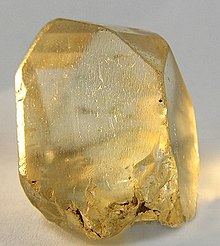 |
Topaz from the Jos Plateau in Plateau State
|
Manufacturing and technology
 |
| Ajaokuta factory |
Nigeria in recent years has been embracing industrialisation. It currently has an indigenous vehicle manufacturing company, Innoson Motors, which manufactures Rapid Transit Buses, trucks and SUVs with an upcoming introduction of cars. Nigeria also has few Electronic manufacturers like Zinox, the first Branded Nigerian Computer and Electronic gadgets (like tablet PCs) manufacturers. In 2013, Nigeria introduced a policy regarding import duty on vehicles to encourage local manufacturing companies in the country. In this regard, some foreign vehicle manufacturing companies like Nissan have made known their plans to have manufacturing plants in Nigeria. Ogun is considered to be the current Nigeria's industrial hub, as most factories are located in Ogun and more companies are moving there, followed by Lagos. The city of Aba in south-eastern part of the country are well known for their handicrafts, famously known as "Aba made".
Government satellites
The Nigerian government has commissioned the overseas production and launch of four satellites. The Nigeriasat-1 was the first satellite to be built under the Nigerian government sponsorship. The satellite was launched from Russia on 27 September 2003. Nigeriasat-1 was part of the worldwide Disaster Monitoring Constellation System. The primary objectives of the Nigeriasat-1 were: to give early warning signals of environmental disaster; to help detect and control desertification in the northern part of Nigeria; to assist in demographic planning; to establish the relationship between malaria vectors and the environment that breeds malaria and to give early warning signals on future outbreaks of meningitis using remote sensing technology; to provide the technology needed to bring education to all parts of the country through distant learning; and to aid in conflict resolution and border disputes by mapping out state and International borders.NigeriaSat-2, Nigeria's second satellite, was built as a high-resolution earth satellite by Surrey Space Technology Limited, a United Kingdom-based satellite technology company. It has 2.5-metre resolution panchromatic (very high resolution), 5-metre multispectral (high resolution, NIR red, green and red bands), and 32-metre multispectral (medium resolution, NIR red, green and red bands) antennas, with a ground receiving station in Abuja. The NigeriaSat-2 spacecraft alone was built at a cost of over £35 million. This satellite was launched into orbit from a military base in China.
NigComSat-1, a Nigerian satellite built in 2004, was Nigeria's third satellite and Africa's first communication satellite. It was launched on 13 May 2007, aboard a Chinese Long March 3B carrier rocket, from the Xichang Satellite Launch Centre in China. The spacecraft was operated by NigComSat and the Nigerian Space Agency, NASRDA. On 11 November 2008, NigComSat-1 failed in orbit after running out of power because of an anomaly in its solar array. It was based on the Chinese DFH-4 satellite bus, and carries a variety of transponders: 4 C-band; 14 Ku-band; 8 Ka-band; and 2 L-band. It was designed to provide coverage to many parts of Africa, and the Ka-band transponders would also cover Italy.
On 10 November 2008 (0900 GMT), the satellite was reportedly switched off for analysis and to avoid a possible collision with other satellites. According to Nigerian Communications Satellite Limited, it was put into "emergency mode operation in order to effect mitigation and repairs". The satellite eventually failed after losing power on 11 November 2008.
On 24 March 2009, the Nigerian Federal Ministry of Science and Technology, NigComSat Ltd. and CGWIC signed another contract for the in-orbit delivery of the NigComSat-1R satellite. NigComSat-1R was also a DFH-4 satellite, and the replacement for the failed NigComSat-1 was successfully launched into orbit by China in Xichang on 19 December 2011. The satellite, according to then-Nigerian President Goodluck Jonathan, was paid for by the insurance policy on NigComSat-1, which de-orbited in 2009. It was stated the satellite would have a positive impact on national development in various sectors such as communications, internet services, health, agriculture, environmental protection and national security
Society
Demographics
| Population in Nigeria | |||
|---|---|---|---|
| Year | Million | ||
| 1971 | 55 | ||
| 1980 | 71 | ||
| 1990 | 95 | ||
| 2000 | 125 | ||
| 2004 | 138 | ||
| 2008 | 151 | ||
| 2012 | 167 | ||
| 2016 | 186 | ||
| 2017 | 191 | ||
 |
| Population density in Nigeria |
According to the United Nations, Nigeria has been undergoing explosive population growth and has one of the highest growth and fertility rates in the world. By their projections, Nigeria is one of eight countries expected to account collectively for half of the world's total population increase in 2005–2050. By 2100 the UN estimates that the Nigerian population will be between 505 million and 1.03 billion people (middle estimate: 730 million). In 1950, Nigeria had only 33 million people.
One in four Africans is a Nigerian as of 2006 Presently, Nigeria is the seventh most populous country in the world. The birth rate is 36.9-births/1000 population and the death rate is 12.4 deaths/1000 population as of 2017, while the total fertility rate is 5.07 children born/woman.
Nigeria's largest city is Lagos. Lagos has grown from about 300,000 in 1950 to an estimated 13.4 million in 2017.
| Largest Cities in Nigeria, 2017 | |||
|---|---|---|---|
| City | Million | ||
| Lagos | 13.463 | ||
| Kanos | 3.82 | ||
| Ibadan | 3.383 | ||
| Abuja | 2.919 | ||
| Port Harcourt | 2.343 | ||
| Benin City | 1.628 | ||
Ethnic groups
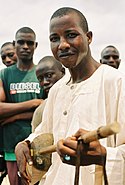
|

|
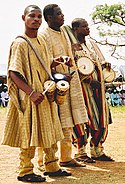
|
| A Hausa harpist | Igbo men | Yoruba drummers |
The middle belt of Nigeria is known for its diversity of ethnic groups, including the Pyem, Goemai, and Kofyar. The official population count of each of Nfigeria's ethnicities has always remained controversial and disputed as members of diferent ethnic groups believe the census is rigged to give a particular group (usually believed to be northern groups) numerical superiority.
There are small minorities of British, American, East Indian, Chinese (est. 50,000), white Zimbabwean, Japanese, Greek, Syrian and Lebanese immigrants in Nigeria. Immigrants also include those from other West African or East African nations. These minorities mostly reside in major cities such as Lagos and Abuja, or in the Niger Delta as employees for the major oil companies. A number of Cubans settled in Nigeria as political refugees following the Cuban Revolution.
In the middle of the 19th century, a number of ex-slaves of Afro-Cuban and Afro-Brazilian descent and emigrants from Sierra Leone established communities in Lagos and other regions of Nigeria. Many ex-slaves came to Nigeria following the emancipation of slaves in the Americas. Many of the immigrants, sometimes called Saro (immigrants from Sierra Leone) and Amaro (ex-slaves from Brazil) later became prominent merchants and missionaries in these cities.
Languages
 |
| Map of Nigeria's linguistic groups |
In some areas of Nigeria, ethnic groups speak more than one language. The official language of Nigeria, English, was chosen to facilitate the cultural and linguistic unity of the country, owing to the influence of British colonisation that ended in 1960.
Many French speakers from surrounding countries have influenced the English spoken in the border regions of Nigeria and some Nigerian citizens have become fluent enough in French to work in the surrounding countries. The French spoken in Nigeria may be mixed with some native languages but is mostly spoken like the French spoken in Benin. French may also be mixed with English as it is in Cameroon. Most of the population speaks English as their native language.
The major languages spoken in Nigeria represent three major families of languages of Africa: the majority are Niger-Coiness transactions and for official purposes. English as a first language is used only by a small minority of the country's urban elite, and it is not spoken at all in some rural areas. Hausa is the most widely spoken of the three main languages spoken in Nigeria itself (Igbo, Hausa and Yoruba) but unlike the Yorubas and Igbos, the Hausas tend not to travel far outside Nigeria itself.
With the majority of Nigeria's populace in the rural areas, the major languages of communication in the country remain indigenous languages. Some of the largest of these, notably Yoruba and Igbo, have derived standardised languages from a number of different dialects and are widely spoken by those ethnic groups. Nigerian Pidgin English, often known simply as "Pidgin" or "Broken" (Broken English), is also a popular lingua franca, though with varying regional influences on dialect and slang. The pidgin English or Nigerian English is widely spoken within the Niger Delta Regions, predominantly in Warri, Sapele, Port Harcourt, Agenebode, Ewu, and Benin City.
ngo languages, such as Igbo, Yoruba and Fulfulde; Kanuri, spoken in the northeast, primarily in Borno and Yobe State, is part of the Nilo-Saharan family; and Hausa is an Afroasiatic language.
Even though most ethnic groups prefer to communicate in their own languages, English as the official language is widely used for education, bus
Religion
Islam (40%)
Christian (50.0%)
Other religions (10.0%)
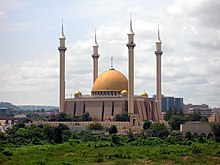 |
The Abuja National Mosque.
The Abuja National Mosque.
|
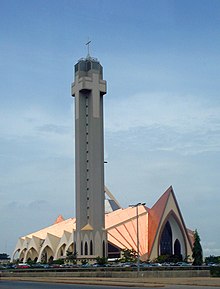 |
| National Church of Nigeria, Abuja. |
Islam dominates North Western (Hausa, Fulani and others) and a good portion of Northern Eastern (Kanuri, Fulani and other groups) Nigeria. It also has a number of adherents in the South Western, Yoruba part of the country. Nigeria has the largest Muslim population in sub-Saharan Africa. Protestant and locally cultivated Christianity are also widely practiced in Western areas, while Roman Catholicism is a more prominent Christian feature of South Eastern Nigeria. Both Protestantism and Roman Catholicism are observed in the Ibibio, Annang, Efik and Ijo lands of the south.
The 1963 census indicated that 47% of Nigerians were Muslim, 35% Christian, and 18% members of local indigenous congregations. If accurate, this indicated a sharp increase since 1953 in the number of Christians (up 23%); a decline among those professing indigenous beliefs, compared with 20%; and only a modest (6%) drop of Muslims which can likely be attributed to immigration, emigration, and birthrate.
The vast majority of Muslims in Nigeria are Sunni belonging to Maliki school of jurisprudence; however, a sizeable minority also belongs to Shafi madhhab. A large number of Sunni Muslims are members of Sufi brotherhoods. Most Sufis follow the Qadiriyya, Tijaniyyah and/or the Mouride movements. A significant Shia minority exists (see Shia in Nigeria). Some northern states have incorporated Sharia law into their previously secular legal systems, which has brought about some controversy. Kano State has sought to incorporate Sharia law into its constitution.The majority of Quranists follow the Kalo Kato or Quraniyyun movement. There are also Ahmadiyya and Mahdiyya minorities, as well as Bahá'ís.
According to a 2001 report from The World Factbook by CIA, about 47% of Nigeria's population is Muslim, 43% are Christians and 10% adhere to local religions. But in some recent report, the Christian population is now sightly larger than the Muslim population. An 18 December 2012 report on religion and public life by the Pew Research Center stated that in 2010, 49.3 percent of Nigeria's population was Christian, 48.8 percent was Muslim, and 1.9 percent were followers of indigenous and other religions, or unaffiliated.Additionally, the 2010s census of Association of Religion Data Archives has reported that 46.5 percent of the total population is Christian, slightly bigger than the Muslim population of 45.5 percent, and that 7.7 percent are members of other religious groups.
The 2010 census of Association of Religion Data Archives has also reported that 46.5% of the total population was Christian, slightly larger than the Muslim population of 45.5%, while 7.7% were members of other religions. However, these estimates should be taken with caution because sample data is mostly collected from major urban areas in the south, which are predominantly Christian.
Among Christians, the Pew Research survey found that 74% were Protestant, 25% were Catholic, and 1% belonged to other Christian denominations, including a small Orthodox Christian community. In terms of Nigeria's major ethnic groups, the Hausa ethnic group (predominant in the north) was found to be 95% Muslim and 5% Christian, the Yoruba tribe (predominant in the west) was 55% Muslim, 35% Christian and 10% adherents of other religions, while the Igbos (predominant in the east) and the Ijaw (south) were 98% Christian, with 2% practising traditional religions. The middle belt of Nigeria contains the largest number of minority ethnic groups in Nigeria, who were found to be mostly Christians and members of traditional religions, with a small proportion of Muslims.
Leading Protestant churches in the country include the Church of Nigeria of the Anglican Communion, the Assemblies of God Church, the Nigerian Baptist Convention and The Synagogue, Church Of All Nations. Since the 1990s, there has been significant growth in many other churches, independently started in Africa by Africans, particularly the evangelical Protestant ones. These include the Redeemed Christian Church of God, Winners' Chapel, Christ Apostolic Church (the first Aladura Movement in Nigeria), Living Faith Church Worldwide, Deeper Christian Life Ministry, Evangelical Church of West Africa, Mountain of Fire and Miracles, Christ Embassy, Lord's Chosen Charismatic Revival Movement, Celestial Church of Christ, and Dominion City. In addition, The Church of Jesus Christ of Latter-day Saints, the Aladura Church, the Seventh-day Adventist and various indigenous churches have also experienced growth.
The Yoruba area contains a large Anglican population, while Igboland is predominantly Roman Catholic and the Edo area is composed predominantly of members of the Pentecostal Assemblies of God, which was introduced into Nigeria by Augustus Ehurie Wogu and his associates at Old Umuahia.
Further, Nigeria has become an African hub for the Grail Movement and the Hare Krishnas, and the largest temple of the Eckankar religion is in Port Harcourt, Rivers State, with a total capacity of 10,000.
The Church of Jesus Christ of Latter-Day Saints (LDS) announced creation of new Owerri mission in Nigeria in 2016.
Health
 |
| A hospital in Abuja, Nigeria's capital |
 |
| At a dental office in Lagos. |
 |
| Successful emergency Caesarean section done in Nigeria |
.
HIV/AIDS rate in Nigeria is much lower compared to the other African nations such as Kenya or South Africa whose prevalence (percentage) rates are in the double digits. As of 2012, the HIV prevalence rate among adults ages 15–49 was just 3.1 percent.As of 2014, life expectancy in Nigeria is 52.62 years on average according to CIA, and just over half the population have access to potable water and appropriate sanitation; As of 2010, the infant mortality is 8.4 deaths per 1000 live births.
Nigeria was the only country in Africa to have never eradicated polio, which it periodically exported to other African countries; Polio was cut 98% between 2009 and 2010. However, a major breakthrough came in December 2014, when it was reported that Nigeria hadn't recorded a polio case in 6 months, and was on its way to being declared Polio free. In 2012, a new bone marrow donor program was launched by the University of Nigeria to help people with leukaemia, lymphoma, or sickle cell disease to find a compatible donor for a life-saving bone marrow transplant, which cures them of their conditions. Nigeria became the second African country to have successfully carried out this surgery. In the 2014 ebola outbreak, Nigeria was the first country to effectively contain and eliminate the Ebola threat that was ravaging three other countries in the West African region, the Nigerian unique method of contact tracing employed by Nigeria became an effective method later used by countries such as the United States, when ebola threats were discovered.
The Nigerian health care system is continuously faced with a shortage of doctors known as 'brain drain', because of emigration by skilled Nigerian doctors to North America and Europe. In 1995, it was estimated that 21,000 Nigerian doctors were practising in the United States alone, which is about the same as the number of doctors working in the Nigerian public service. Retaining these expensively trained professionals has been identified as one of the goals of the government.
Education
 |
| The University of Lagos |
Nigeria provides free, government-supported education, but attendance is not compulsory at any level, and certain groups, such as nomads and the handicapped, are under-served. The education system consists of six years of primary school, three years of junior secondary school, three years of senior secondary school, and four, five or six years of university education leading to a bachelor's degree.
Tertiary education
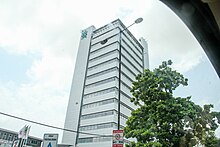 |
| Open University of Nigeria, Lagos |
First year entry requirements into most universities in Nigeria include: Minimum of SSCE/GCE Ordinary Level Credits at maximum of two sittings; Minimum cut-off marks in Joint Admission and Matriculation Board Entrance Examination (JAMB) of 180 and above out of a maximum of 400 marks are required. Candidates with minimum of Merit Pass in National Certificate of Education (NCE), National Diploma (ND) and other Advanced Level Certificates minimum qualifications with minimum of 5 O/L Credits are given direct entry admission into the appropriate undergraduate degree programs.
Students with required documents typically enter university from age 17-18 onwards and study for an academic degree.
Crime
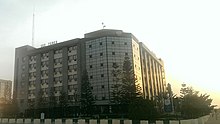 |
| SEC Tower, home of the Securities and Exchange Commission. |
Internationally, Nigeria is infamous for a form of bank fraud dubbed 419, a type of advance fee fraud (named after Section 419 of the Nigerian Penal Code) along with the "Nigerian scam", a form of confidence trick practised by individuals and criminal syndicates. These scams involve a complicit Nigerian bank (the laws being set up loosely to allow it) and a scammer who claims to have money he needs to obtain from that bank. The victim is talked into exchanging bank account information on the premise that the money will be transferred to him, and then he'll get to keep a cut. In reality, money is taken out instead, and/or large fees (which seem small in comparison with the imaginary wealth he awaits) are deducted. In 2003, the Nigerian Economic and Financial Crimes Commission (or EFCC) was created, ostensibly to combat this and other forms of organised financial crime.
There is some major piracy in Nigeria, with attacks directed at all types of vessels. Consistent with the rise of Nigeria as an increasingly dangerous hot spot, 28 of the 30 seafarers kidnapped as of January–June 2013 were in Nigeria. Additionally, the single death to date in 2013 occurred in Nigeria.
Nigeria has been pervaded by political corruption. It was ranked 143 out of 182 countries in Transparency International's 2011 Corruption Perceptions Index; however, it improved to 136th position in 2014.
More than $400 billion were stolen from the treasury by Nigeria's leaders between 1960 and 1999. In late 2013, Nigeria's then central bank governor Lamido Sanusi informed President Goodluck Jonathan that the state oil company, NNPC, had failed to remit US$20 billion in oil revenues, which it owed the state. Jonathan, however, dismissed the claim and replaced Sanusi for alleged mismanagement of the central bank's budget. A Senate committee also found Sanusi's account to be lacking substance. After the conclusion of the NNPC's account audit, it was announced in January 2015 that NNPC's non-remitted revenue is actually US$1.48 billion, which it needs to refund back to the Government.
In 2015, Nigerian President Muhammadu Buhari stated that corrupt officials have stolen $150 billion from Nigeria in the last 10 years.
Tourism
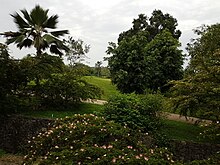 |
| Meridien Akwa Ibom golf course park |
 |
| African Bush Elephants in Yankari National Park, Bauchi State. |
 |
| Jabi lake |
 |
| Lekki Beach in Lagos |
 |
| The Peak of Obudu Mountain, Cross River State |
Lagos has become an important location for African and "black" cultural identity. Lots of festivals are held in Lagos; festivals vary in offerings each year and may be held in different months. Some of the festivals are Festac Food Fair held in Festac Town Annually, Eyo Festival, Lagos Black Heritage Carnival, Lagos Carnival, Eko International Film Festival, Lagos Seafood Festac Festival, LAGOS PHOTO Festival and the Lagos Jazz Series, which is a unique franchise for high-quality live music in all genres with a focus on jazz. Established in 2010, the event takes place over a 3–5 day period at selected high quality outdoor venues. The music is as varied as the audience itself and features a diverse mix of musical genres from rhythm and blues to soul, Afrobeat, hip hop, bebop, and traditional jazz. The festivals provide entertainment of dance and song to add excitement to travelers during a stay in Lagos.
Lagos has a number of sandy beaches by the Atlantic Ocean, including Elegushi Beach and Alpha Beach. Lagos also has a number of private beach resorts including Inagbe Grand Beach Resort and several others in the outskirts.
Lagos has a variety of hotels ranging from three star to five star hotels, with a mixture of local hotels such as Eko Hotels and Suites, Federal Palace Hotel and franchises of multinational chains such as Intercontinental Hotel, Sheraton and Four Points by Hilton. Other places of interest include the Tafawa Balewa Square, Festac town, The Nike Art Gallery, Freedom Park, Lagos and the Cathedral Church of Christ, Lagos.
Obudu Mountain Resort is a ranch and resort on the Obudu Plateau in Cross River State. It was developed in 1951 by M. McCaughley, a Scot who first explored the mountain ranges in 1949. He camped on the mountaintop of the Oshie Ridge on the Sankwala Mountains for a month before returning with Mr. Hugh Jones, a fellow rancher, in 1951. Together with Dr. Crawfeild, they developed the Obudu Cattle Ranch Although the ranch has been through troubles since, it has been rehabilitated to its former glory.
 |
| Mini waterfall at the grotto in Becheve Nature Reserve, a major attraction on Obudu Plateau |
 |
| Kajuru Castle, Kaduna built in 1978 |
The resort is found on the Obudu Plateau, close to the Cameroon border in the northeastern part of Cross River State, approximately 110 kilometres (68 mi) east of the town of Ogoja and 65 kilometres (40 mi) from the town of Obudu in Obanliku Local Government Area of Cross River State. It is about 30 minutes drive from Obudu town and is about a 332 kilometres (206 mi) drive from Calabar, the Cross River State capital.
Charter air service is available to the Bebi Airport which lies between the village of Obudu and the resort.
The ranch has in recent times seen an influx of both Nigerian and international tourists because of the development of tourist facilities by Cross-River State Government, which has turned the ranch into a well known holiday and tourist resort center in Nigeria.
Culture
Literature
 |
Things Fall Apart by Chinua Achebe
is Africa's most popular and best selling literary piece ever,
translated into over 40 languages across Africa and around the world.
|
Other Nigerian writers and poets who are well known internationally include John Pepper Clark, Ben Okri, Cyprian Ekwensi, Buchi Emecheta, Helon Habila, T. M. Aluko, Chimamanda Ngozi Adichie, Daniel O. Fagunwa, Femi Osofisan and Ken Saro Wiwa, who was executed in 1995 by the military regime. Nigeria has the second largest newspaper market in Africa (after Egypt) with an estimated circulation of several million copies daily in 2003.
Critically acclaimed writers of a younger generation include Adaobi Tricia Nwaubani, Chris Abani, Sefi Atta, Helon Habila, Helen Oyeyemi, Nnedi Okorafor, Kachi A. Ozumba, Sarah Ladipo Manyika, and Chika Unigwe.
Media
Music and film
 |
| Wizkid is a popular musician in Nigeria, Africa and Worldwide |
Many late 20th-century musicians such as Fela Kuti have famously fused cultural elements of various indigenous music with American jazz and soul to form Afrobeat which has in turn influenced hip hop music. JuJu music, which is percussion music fused with traditional music from the Yoruba nation and made famous by King Sunny Adé, is from Nigeria. Fuji music, a Yoruba percussion style, was created and popularised by Mr. Fuji, Alhaji Sikiru Ayinde Barrister.
Afan Music was invented and popularised by the Ewu-born poet and musician Umuobuarie Igberaese. There is a budding hip-hop movement in Nigeria. Kennis Music, the self-proclaimed number-one record label in Africa, and one of Nigeria's biggest record labels, has a roster almost entirely dominated by hip-hop artists.
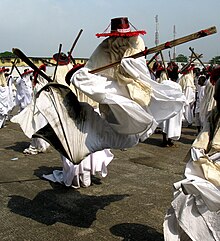 |
| An Eyo Iga Olowe Salaye masquerade jumping |
In November 2008, Nigeria's music scene (and that of Africa) received international attention when MTV hosted the continent's first African music awards show in Abuja. Additionally, the very first music video played on MTV Base Africa (the 100th station in the MTV network) was Tuface Idibia's pan-African hit "African Queen".
The Nigerian film industry is known as Nollywood (a portmanteau of Nigeria and Hollywood) and is now the 2nd-largest producer of movies in the world. Nigerian film studios are based in Lagos, Kano and Enugu, forming a major portion of the local economy of these cities. Nigerian cinema is Africa's largest movie industry in terms of both value and the number of movies produced per year. Although Nigerian films have been produced since the 1960s, the country's film industry has been aided by the rise of affordable digital filming and editing technologies.
The 2009 thriller film The Figurine is generally considered the game changer, which heightened the media attention towards New Nigerian Cinema revolution. The film was a critical and commercial success in Nigeria, and it was also screened in international film festivals. The 2010 film Ijé by Chineze Anyaene, overtook The Figurine to become the highest grossing Nigerian film; a record it held for four years, until it was overtaken in 2014 by Half of a Yellow Sun (2013).By 2016, this record was held by The Wedding Party, a film by Kemi Adetiba.
By the end of 2013, the film industry reportedly hit a record breaking revenue of ₦1.72 trillion (US$11 billion). As of 2014, the industry was worth ₦853.9 billion (US$5.1 billion) making it the third most valuable film industry in the world, behind the United States and India. It contributed about 1.4% to Nigeria's economy; this was attributed to the increase in the number of quality films produced and more formal distribution methods.
T.B. Joshua's Emmanuel TV, originating from Nigeria, is one of the most viewed television stations across Africa.
There are many festivals in Nigeria, some of which date to the period before the arrival of the major religions in this ethnically and culturally diverse society. The main Muslim and Christian festivals are often celebrated in ways that are unique to Nigeria or unique to the people of a locality. The Nigerian Tourism Development Corporation has been working with the states to upgrade the traditional festivals, which may become important sources of tourism revenue.
Cuisine
 |
| A Plate of Pounded Yam (Iyan) and Egusi Soup with Tomatoes Stew. |
Sport
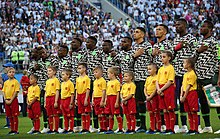 |
Nigeria at the 2018 FIFA World Cup
|
The nation's cadet team from Japan '93 produced some international players notably Nwankwo Kanu, a two-time African Footballer of the year who won the European Champions League with Ajax Amsterdam and later played with Inter Milan, Arsenal, West Bromwich Albion and Portsmouth. Other players that graduated from the junior teams are Nduka Ugbade, Jonathan Akpoborie, Victor Ikpeba, Celestine Babayaro, Wilson Oruma and Taye Taiwo. Some other famous Nigerian footballers include John Obi Mikel, Obafemi Martins, Vincent Enyeama, Yakubu, Rashidi Yekini, Peter Odemwingie and Jay-Jay Okocha.
 |
| Nigerian football supporters at the 2018 FIFA World Cup in Russia |
Nigeria's national basketball team made the headlines internationally when it qualified for the 2012 Summer Olympics as it beat heavily favoured world elite teams such as Greece and Lithuania. Nigeria has been home to numerous internationally recognised basketball players in the world's top leagues in America, Europe and Asia. These players include Basketball Hall of Famer Hakeem Olajuwon, and later NBA draft picks Solomon Alabi, Yinka Dare, Obinna Ekezie, Festus Ezeli, Al-Farouq Aminu and Olumide Oyedeji.
Nigeria made history by qualifying the first bobsled team for the Winter Olympics from Africa when their Women's 2-man team qualified for the bobsled competition at the XXIII Olympic Winter Games in Pyeongchang, South Korea.
In the early 1990s, Scrabble was made an official sport in Nigeria. By the end of 2017, there were around 4,000 players in more than 100 clubs in the country. In 2015, Wellington Jighere became the first African player to win World Scrabble Championship.
Social issues
Despite its vast government revenue from the mining of petroleum, Nigeria faces a number of societal issues, owing primarily to a history of inefficiency in its governance.Human rights
 |
| Stanmore Court, Lagos |
Under the Shari'a penal code that applies to Muslims in twelve northern states, offences such as alcohol consumption, homosexuality, infidelity and theft carry harsh sentences, including amputation, lashing, stoning and long prison terms.
Under a law signed in early 2014, same-sex couples who marry face up to 14 years each in prison. Witnesses or anyone who helps gay couples marry will be sentenced to 10 years behind bars. The bill also punishes the "public show of same-sex amorous relationships directly or indirectly" with ten years in prison. Another portion of the bill mandates 10 years in prison for those found guilty of organising, operating or supporting gay clubs, organizations and meetings.
In the Nigerian state of Akwa Ibom about 15,000 children were branded as witches and most of them end up abandoned and abused on the streets.
Strife and sectarian violence
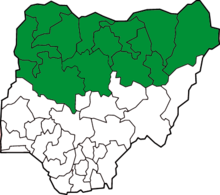 |
| Nigerian states that implement some form of sharia law (in green) |
Since the end of the civil war in 1970, some ethnic violence has persisted. There has subsequently been a period of relative harmony since the Federal Government introduced tough new measures against religious violence in all affected parts of the country. The 2002 Miss World pageant was moved from Abuja to London in the wake of violent protests by Muslims in the Northern part of the country that left more than 100 people dead and over 500 injured. The rioting erupted after Muslims in the country reacted in anger to comments made by a newspaper reporter. Muslim rioters in Kaduna killed an estimated 105 men, women, and children with a further 521 injured taken to hospital.
Since 2002, the country has seen sectarian violence by Boko Haram, an Islamist movement that seeks to abolish the secular system of government and establish Sharia law in the country. In the 2010 Jos riots, more than 500 people were killed by Muslim religious violence.
Nigerian President Goodluck Jonathan in May 2014 claimed that Boko Haram attacks have left at least 12,000 people dead and 8,000 people crippled. In May 2014 Benin, Chad, Cameroon and Niger joined Nigeria in a united effort to combat Boko Haram in the aftermath of the 2014 Chibok kidnapping of 276 schoolgirls.
In April 2016, over 500 people in ten villages in predominantly Christian areas in Agatu were murdered by Fulani herdsmen. A visiting Nigerian Senator reported that all the primary and post-primary schools, health centres, worship centres as well as the police station in the area were destroyed. The UNHCR representative said in 20 years of work, she had "never seen such a level of destruction"..
CURLED FROM WIKIPEDIA
Tags
Nigerian culture



